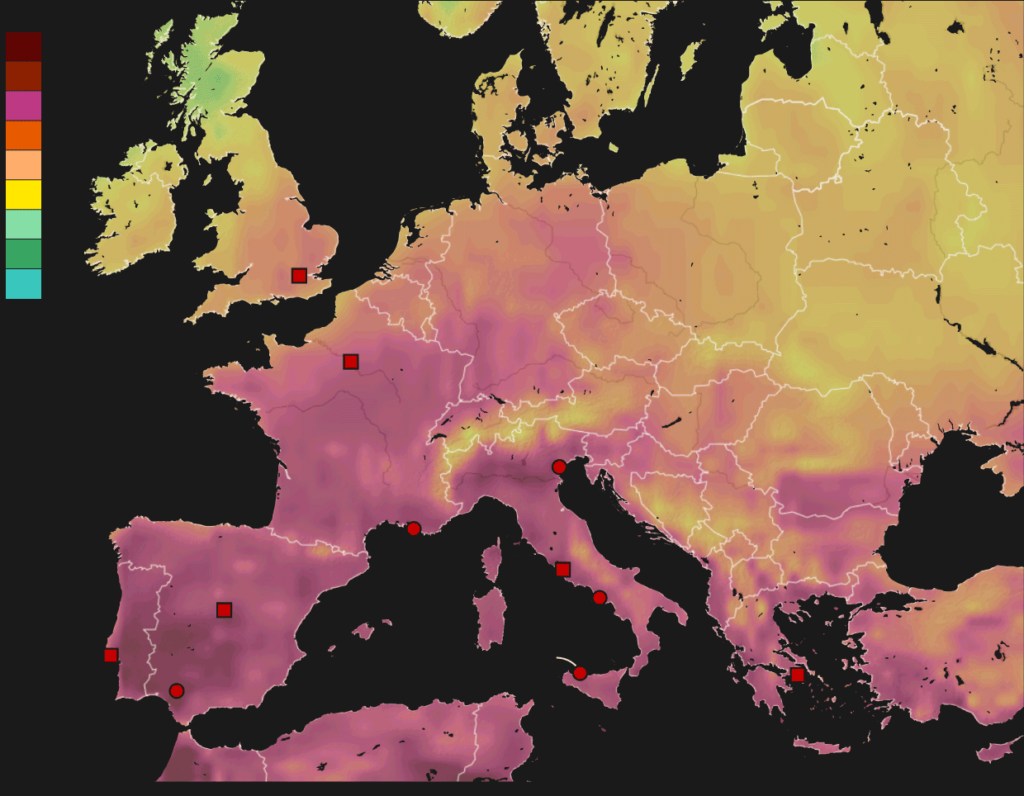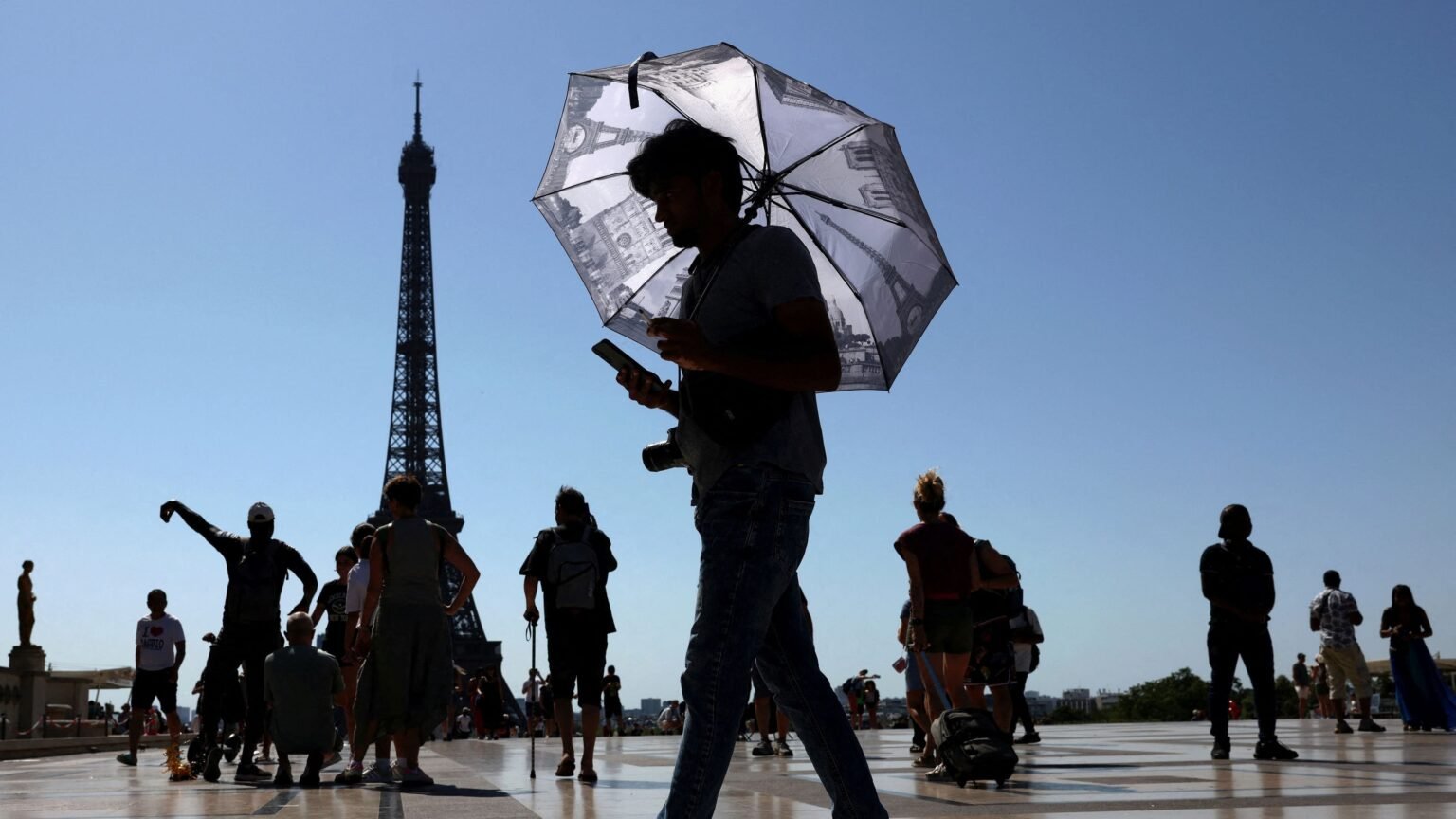European Heatwave Records 2025: Scorching Temperatures Across the Continent
European heatwave records 2025 are being shattered across the continent, as Spain and England experience their hottest June on record. This extreme weather event is causing widespread wildfires, health emergencies, and environmental stress — a sign that climate change is accelerating. Experts warn that European heatwave records 2025 may be the clearest indicator yet of the dangerous path ahead.

From Portugal to Turkey, the unprecedented rise in temperatures is fueling evacuations, damaging ecosystems, and straining public services. According to climate scientists, European heatwave records 2025 are not isolated anomalies but part of an escalating global pattern that demands urgent policy and infrastructure adaptation.
Night-Time Heat Surges Linked to European Heatwave Records 2025
Heatwaves aren’t just occurring during the day. Nighttime temperatures have soared as well, limiting the body’s ability to cool down. In Seville, temperatures didn’t fall below 28°C overnight, while Barcelona reported lows of 27°C — levels typically associated with desert environments.
In London, the temperature reached 34.7°C in St James’s Park, marking the hottest day of the year so far for the UK. Heathrow Airport reported a sweltering 33.1°C, and Wimbledon’s opening day saw 32.9°C, making it the hottest tournament start on record.
Wildfires and Mass Evacuations Across Southern Europe
Southern Europe has been particularly hard-hit, with Turkey, Greece, and Italy facing dozens of simultaneous wildfires. In Turkey, more than 50,000 people were evacuated from the Izmir region alone as dry conditions fueled more than 260 fires over just three days.
Fire also tore through parts of Bilecik, Hatay, Sakarya, and Manisa provinces. Turkish emergency response teams remain on high alert as more hot and dry days are forecast.
In Greece, flames approached the capital city of Athens, with coastal towns experiencing home losses and forced evacuations. Authorities continue to issue red alerts across Attica and neighboring regions.
European Heatwave Records 2025 Trigger Red Alerts in France and Italy
Across France, the heatwave has been labeled “unprecedented” by officials. In Paris, the temperature reached 37.6°C at Orly Airport. The Eiffel Tower’s summit was temporarily closed due to extreme conditions, as local authorities activated red alert protocols. The Paris region hasn’t issued a red alert since 2019.
A total of 1,896 schools and colleges were shut down nationwide, as heat risked health complications for students and staff.

Meanwhile in Italy, health systems faced strain with hospital admissions rising 20% in Tuscany. Twenty-one of 27 major cities across Italy issued their highest-level heat alert, with regional governments advising citizens to stay indoors during peak afternoon hours.
Lombardy implemented a temporary ban on outdoor work from 12:30 to 16:00 on construction sites, farms, and roads — a move praised by labor unions and climate groups alike.
Central and Eastern Europe Also Feel the Burn
In Germany, meteorological officials warned that temperatures could hit nearly 38°C in Berlin and Frankfurt, intensifying the heatwave gripping central Europe. The Rhine River, crucial for transporting goods, has seen water levels drop significantly, limiting barge traffic and increasing freight costs.
The Balkans are also experiencing heat stress. Montenegro reported multiple wildfire incidents. While some areas have begun to cool, the cumulative impact of successive hot days is already visible.
Environmental Impact of European Heatwave Records 2025: Glaciers, Sea Life, and Soil
The consequences of Europe’s heatwave go beyond human health. Alpine glaciers, already shrinking due to rising global temperatures, are experiencing record melt rates this season. The heatwave is accelerating ice loss across Switzerland, Austria, and northern Italy, threatening freshwater supplies.
In the Adriatic Sea, unusually warm waters have prompted the spread of invasive species, including the venomous lionfish, which disrupt local marine ecosystems and pose a risk to swimmers and fishers.
High heat and dry soil are also intensifying drought conditions across southern Europe, stressing agricultural yields and increasing the likelihood of crop failures.
Climate Scientists Sound Alarm Over European Heatwave Records 2025
Experts have pointed out that these heat extremes are consistent with models predicting human-driven climate change.
According to Professor Richard Allan, a climate scientist at the University of Reading, “Rising levels of greenhouse gases are trapping more heat in the atmosphere, making it harder for the planet to cool. The atmosphere is warmer and thirstier, drying out soils and making heatwaves more intense.”
This heatwave, he said, is part of a growing trend of moderate heat events becoming extreme — a transformation already underway.
UN Urges Immediate Climate Action
The United Nations Human Rights Council also addressed the issue, with High Commissioner Volker Turk calling the heatwave a clear signal that urgent climate action is needed. Turk emphasized that environmental changes directly threaten human rights, including:
- The right to life
- The right to health
- The right to a clean and sustainable environment
He urged governments to move away from fossil fuels, restructure energy systems, and invest in climate adaptation strategies.
Historical Context: How Unusual Is This Heat?
According to provisional data, June 2025 is the hottest June on record for Spain and England, while being the second hottest June for the UK overall, only surpassed by June 2023 (15.8°C).
Experts emphasize that it’s not just about breaking records, but the consistency with which these records are being shattered year after year. The IPCC (Intergovernmental Panel on Climate Change) warns that such events are no longer anomalies but part of a new climate reality.
Heatwave and Public Health: A Growing Crisis
Heatwaves have increasingly become public health emergencies, particularly in urban areas with dense populations and limited green space. Rising temperatures lead to:
- Increased risk of dehydration and heatstroke
- Greater pressure on healthcare systems
- Reduced sleep quality due to night-time heat
- Dangerous working conditions for outdoor laborers
In many European cities, local governments are setting up cooling centers, distributing bottled water, and offering free transport to hospitals and safe shelters.
How Are Countries Responding?
Governments across Europe are adopting a range of measures:
- France: Issuing emergency funding to municipalities for heat relief infrastructure
- Spain: Implementing fire bans in vulnerable zones and expanding weather alert systems
- Germany: Advising businesses to reschedule outdoor labor hours
- Italy: Encouraging water conservation and introducing mobile medical teams
The European Commission is also considering climate-related subsidies to help lower-income citizens cope with energy costs related to cooling.
Citizens Take Action: Grassroots Responses
Residents, too, are adapting. Across cities like Rome, Madrid, and Lisbon, communities are organizing volunteer networks to check on the elderly and vulnerable. Solar-powered water stations, misting tents, and mobile shade canopies are being deployed in high-traffic areas.

In rural communities, traditional architecture — with its thick stone walls and shaded courtyards — has proven more resilient than modern buildings during prolonged heat.
Looking Ahead: Will July and August Be Worse?
While some forecasts show a brief reprieve in parts of Western Europe in early July, climatologists warn that July and August could bring even higher temperatures, especially in southern and central regions.
Early indicators show that El Niño conditions may intensify further, increasing the likelihood of extended dry spells and additional heatwaves into late summer.
A Summer Europe Will Never Forget
The European heatwave records 2025 are more than just statistics — they are urgent signals of a planet under pressure. With Spain and England enduring their hottest June ever, and wildfires triggering mass evacuations from Turkey to Italy, Europe is confronting the realities of climate disruption.

What happens next matters. How governments respond, how citizens adapt, and how urgently we work to reduce global emissions will shape the future. Without bold action, European heatwave records 2025 could be just the beginning of an increasingly dangerous pattern — turning exceptional summers into the new norm.




